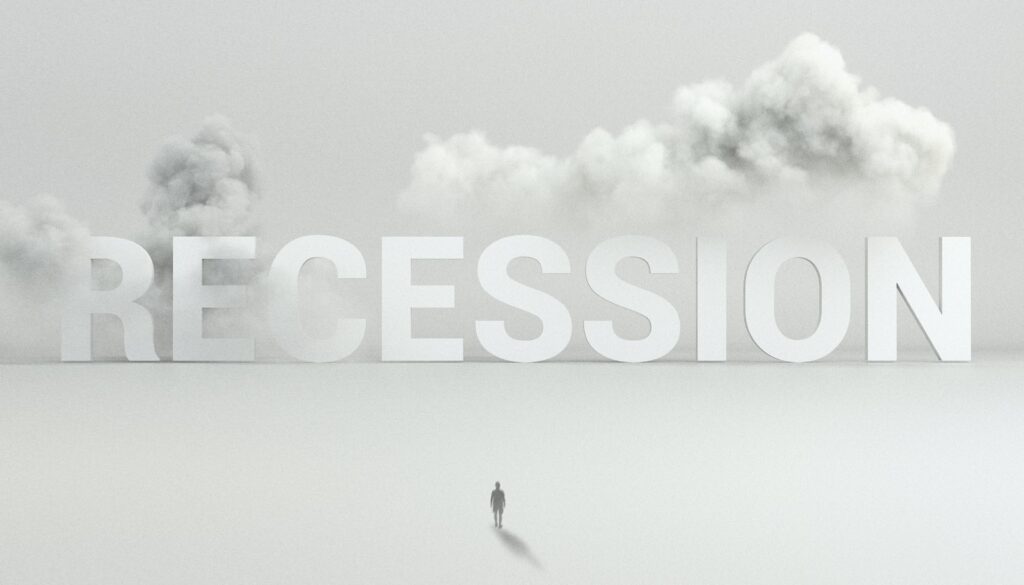In recent times, recession bells have been blaring owing to persistent inflation, increasing interest rates, and stock market volatility. Investing in a recession might be worrisome, but it doesn’t have to be if you know what to look for.
A recession is characterized by two or more consecutive quarters of decreasing GDP.
Recessions are not just caused by weak economic growth. These are frequently followed by widespread job losses, fewer available jobs, and increasing government assistance.
Given this, you may wonder if investing is a good idea in a recession or impending recession. Is it more prudent to keep every dollar you earn in cash?
Investing in a recession: when is it safe?
During a recession, stock prices frequently decrease. In principle, this is bad news for an existing portfolio, but leaving investments alone prevents recession-related losses from being locked in through selling.
Therefore, decreased stock prices provide an excellent opportunity to buy cheaply (relatively speaking). Thus, investing during a recession may be prudent given the following conditions:
If you have a lot of money saved up

You should always strive to have sufficient funds in the bank to cover three to six months’ worth of living expenditures. The latter end of this range being more desirable. If you are present and have additional funds available, you are free to invest them. Otherwise, you should establish an emergency fund immediately.
If you don’t plan to touch your portfolio for at least five years

During a recession, investing is not for the faint of heart. You may believe you are purchasing at a discount, only to see the value of your portfolio fall a few days later. Taking a long-term strategy to investing is the most effective method to prevent losses in a recession and emerge ahead. Aim to reserve your funds for at least five years.
If you’re not going to look at your portfolio all the time
When the economy is in poor health and the stock market is volatile, you may be more motivated to go into your brokerage account every day to check the performance of your portfolio. Yet, if you want to invest during a recession, you cannot do so. The more often you monitor your money, the more prone you are to experience fear. And when you panic, you run the danger of making impulsive moves that lock in losses. Selling underperforming investments may be such a moves.
What should you buy when the economy is bad?
It may be tempting for investors to wait out a recession with no exposure to equities. But they may miss out on big opportunities if they do so. Historically, certain businesses have prospered during economic downturns. The development of a strategy based on countercyclical businesses with solid balance sheets in recession-resistant industries may be a consideration for investors.
Companies with good financial statements

During a recession, look for companies with strong balance sheets and reliable business strategies despite the economic challenges. These firms include utilities, basic consumer products conglomerates, and defense stocks, as examples. In anticipation of worse economic conditions, investors frequently increase their exposure to these groups.
By analyzing a company’s financial data, you may establish whether or not it has minimal debt, good cash flows, and a profit. All of these considerations should be considered prior to making an investment.
“Bullet-proof” companies when investing in a recession
Despite appearances to the contrary, several industries function pretty well during recessions. While seeking an investing plan during market downturns, investors frequently include companies from these recession-resistant industries in their portfolios.
These countercyclical equities tend to do well during recessions because their demand tends to rise when incomes decline. Countercyclical stock prices typically move in the opposite direction of the dominant economic trend. During a recession, the value of these stocks rises. Throughout an expansion, they diminish.
These firms often operate in the following industries: consumer basics, grocery shops, discount retailers, weapon and ammunition manufacturers, alcohol producers, cosmetics, and funeral services.
What to avoid during a recession?
During a recession, understanding which assets to avoid investing in may be just as crucial as knowing which firms make good investments. During a recession, the firms and assets with the most risk are heavily indebted, cyclical, or speculative.
Companies with a lot of debt
The majority of investors would be prudent to avoid highly leveraged corporations with enormous debt loads during a recession. The debt-to-equity (DE) ratio of these enterprises is typically unsustainable due to the weight of interest payments that are greater than usual.
In addition to struggling to fulfill their loan payments, many businesses are also experiencing a decline in sales due to the recession. The chance of insolvency (or at least a dramatic decline in shareholder value) is greater for these firms than for those with smaller debt loads.
Cyclical stocks
Cyclical equities are frequently correlated with employment and consumer confidence, both of which suffer during a recession. During economic expansions, when consumers have more discretionary income to spend on non-essential or luxury things, cyclical equities tend to do better. Examples include manufacturers of luxury automobiles, furniture, and apparel.
When the economy deteriorates, however, people often reduce their discretionary expenditure. They cut expenditures on travel, restaurants, and recreational activities. As a result, cyclical equities in these industries tend to suffer during a recession, making them less desirable as investments.
Speculative stocks

The high valuation of speculative equities is dependent on the optimism of the investor base. This optimism is put to the test during recessions, when these investments often perform the poorest.
Speculative stocks have not yet demonstrated their value and are frequently viewed as possibilities to get in on the first floor of the next major investing opportunity. These high-risk equities frequently decline the quickest during a recession, as investors flee the market for safer assets that restrict their exposure amid market volatility.
Bottom line
Investing during a recession can be a good idea, but only if you are in a solid enough financial situation and if you have the correct mindset and strategy. Never sacrifice your immediate financial stability for long-term gain. Remember that if you are financially struggling, there is no guilt in passing up possibilities. Focus instead on paying your expenses and maintaining your physical and emotional wellness. You may always increase your investments at a later point in your life, once your work is more secure, your income is more stable, and your whole state of mind is more at rest.



